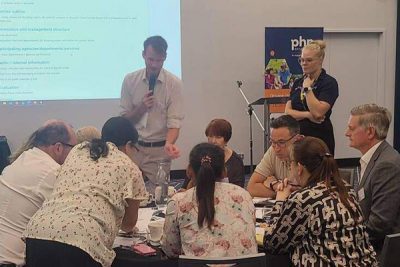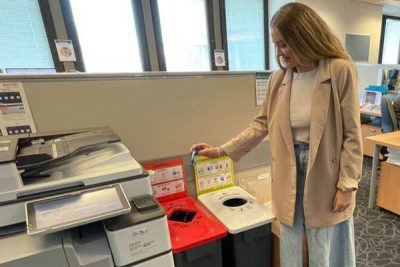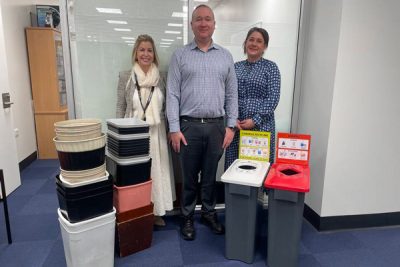
Jane Hancock, Acting Chief Executive
This is a long CE message but it contains some really important information so I would encourage you to take some time to read it to the end and make note of the calls to action.
Firstly, I want to express my appreciation for everyone for how hard you are working, and my gratitude for everyone who turns up for work every day wanting to do your best to make a difference to consumers and our communities. It is important on the tough days to also look after yourselves and draw on the strengths we have as teams.
We had a cooler start to the week, an indication that winter isn’t far away and, with it, peak respiratory illness season. If you haven’t had your flu jab yet, the staff vaccination program is still running. About 2 per cent of ED presentations so far this month are for acute respiratory illnesses, including COVID-19, influenza and RSV.
Your call to action: please make sure you’ve had your 2024 flu vaccination to keep yourself and your loved ones healthy.
Today is IDAHOBIT, the international day when we celebrate diversity of gender and sexuality. As a healthcare organisation, creating an inclusive environment helps our staff to be their best selves and ensures patients can feel safe and trust that we will provide respectful and inclusive care. If you would like to find out more about being an ally, joining the Queensland Health LGBTIQ+ staff network, or just why visibility and inclusion are so important, there are a range of extremely useful resources on QHEPS. You can also contact Pride in Metro North for support or to get involved in events and activities.
Mental Health review
You may have heard this week about a review into mental health services at TPCH. Mental health can be extremely complex and we have seen a significant increase in demand over the past few years. The review will look at whether we have the appropriate resourcing, models of care, and staff support in place to deliver safe and high quality care to meet the demand. I encourage Mental Health staff who have questions or concerns to talk to your line manager in the first instance and take advantage of the range of staff wellbeing supports available if needed.
Business Continuity + Resilience
Healthcare is an essential service, and we are regularly called on to assist in emergencies and natural disasters. We learned from COVID-19 just how resilient healthcare workers are and how quickly we can adapt to changing circumstances and plan on the fly. We are fortunate that our people are great at rolling with it to get the job done. This is particularly challenging when there is a disruption that affects staff as members of the community, such as flooding events. We have seen strong demonstrations of Metro North’s values and commitment to service delivery when our facilities have been cut off and staff have reported for duty at another site.
In health, we know that there is always another disruption of some sort on the horizon. A critical way we manage these situations is by having robust emergency management and business continuity plans that are regularly tested and reviewed. This week is Business Continuity + Resilience Awareness Week, and as we come out of the season of potential natural disasters into the season of respiratory illnesses, it’s timely to review and refresh our business continuity plans (BCP).
Your call to action is to ask yourself if you know the answers to these questions:
- Do you know how to locate your unit’s BCP?
- Have there been changes in your unit that need to be reflected in the BCP?
- Do you know your role during a business disruption?
- Who has been identified to step in if your team leader isn’t available during a disruption?
- Are you prepared at home in the event of a disruption that requires you to come to work?
We have a small but highly skilled Metro North Emergency Management and Business Continuity team, overseen by Dr Liz Rushbrook, with coordinators on the ground across our HHS. The EMBC team is very happy to attend a team meeting to assist your unit to update your business continuity plans.
You might be surprised to learn that Metro North’s incident management arrangements have already been activated at alert or higher more than 110 days since 1 July to support a range of incidents which had the potential to significantly disrupt our ability to deliver care.
That we can be activated and continue to provide services is an indication of how strong our business continuity plans and response framework are.
On Monday Liz and I held a vidcast to launch Business Continuity Awareness + Resilience Week in Metro North Health, where we discussed the importance of business continuity which is particularly critical in healthcare. There were a couple of questions we didn’t have time for, so I said I’d include answers here:
- Have we started prepping for the 2032 Olympics? To an extent, yes. We have a new training provider for the Australian Interagency Incident Management System (AIIMS) which ensures our people can easily slot into an incident management response with other Queensland and Commonwealth agencies. Our emergency management coordinators regularly participate in multi-agency exercises and major event planning as part of our emergency and disaster management activities. As whole of government planning continues over the next few years there will be more specific plans created. An emergency management and business continuity (EMBC) community of practice, for exchanging best practice knowledge and frontline experience, will be formalised in the coming months to further grow EMBC capability across Metro North.
- How are we documenting the integration points between systems? This is a good question. This information should be captured in a Business Impact Analysis (BIA). BIAs are the basis of Business Continuity Plans. There’s a robust roll out process for new systems such as ieMR which includes staff training and downtime procedures, but sometimes we might not be totally aware of all the interdependencies until something goes wrong. We have a lesson management process which captures learnings so risks can be addressed, and plans updated. The Metro North Business Continuity Framework is a great tool to learn more.
- Is the check list on the business continuity website? You can find the unit / team business continuity self-assessment tool on the Metro North business continuity QHEPS page. Contact your emergency management coordinator for your service//unit/team’s next steps. The BCM intranet site is also where you will find a Business Continuity Questionnaire which is available for all staff as a Microsoft form and I would encourage all staff to complete it as it will assist us to understand Metro North’s current business continuity maturity and where we can improve.
EMBC supporting aged care sector resilience
 In a large organisation like Metro North, any significant disruption to our ability to provide care is considered an incident. These incidents are mitigated and managed by business continuity planning.
In a large organisation like Metro North, any significant disruption to our ability to provide care is considered an incident. These incidents are mitigated and managed by business continuity planning.
Metro North’s Emergency Management and Business Continuity (EMBC) team is involved in all phases of disaster response and emergency management within Metro North, including preparedness (planning, training), response, post-incident recovery and lessons management. Incidents can range from major events like the COVID-19 pandemic response, to flooding, IT outages, surges in bed demand, and even a high number of staff on sick leave.
EMBC Director Di Bretherton says since the pandemic, EMBC in partnership with other Metro North teams, including Metro North Public Health, RADAR and OPEN, has been working closely with residential aged care homes (RACHs) to build resilience in the community and assist with planning, as part of the local disaster management committee led by Queensland Police.
Global Accessibility Awareness Day
One of the things we talk about a lot is ensuring our services are accessible, which we often think of as can people get to us if they need us. The third Thursday of May is Global Accessibility Awareness Day which highlights the ways we need to be digitally accessible and inclusive, such as ensuring our patient and community information is available in formats required for people with disabilities.
You might be surprised to know that up to 44 per cent of Australian adults have low literacy, which is particularly significant when we’re talking about often complex healthcare information. Easy English is a writing style that has been developed to provide understandable, concise information for people with low English literacy. It focuses on presenting key information, takes out unnecessary detail, and uses a mix of words and images to enhance the message for the reader.
Since we launched our Disability Services Action Plan earlier this year, we have also been working on an Easy English version as well. Metro North Language Services can now arrange for patient facing documents to be translated into Easy English (also called Easy Read) as well as any other language. Contact Language Services for a quote.
We also created an Easy English version of the recent Local Area Needs Assessment survey and are adding visual image descriptions to Metro North’s social media posts for community members who use screen readers.
Your call to action: please read the Metro North Disability Services Action Plan and take note of any actions and KPIs relevant to your work.
Bin free desks

 This month we took another step in our mission to make Metro North more environmentally sustainable by removing bins from under desks in corporate and admin areas, starting with the Office of the CE. The project is also being rolled out at RBWH, TPCH and Caboolture executive offices. In place of individual bins, there are now separation stations with both a clearly marked general waste and a recycling bin around the space.
This month we took another step in our mission to make Metro North more environmentally sustainable by removing bins from under desks in corporate and admin areas, starting with the Office of the CE. The project is also being rolled out at RBWH, TPCH and Caboolture executive offices. In place of individual bins, there are now separation stations with both a clearly marked general waste and a recycling bin around the space.
In addition to reducing the use of disposable bin liners and encouraging more recycling, staff are getting a bit more incidental exercise. Thanks to the Sustainable Assets and Infrastructure, Metro North Environment and Waste teams, and Green Metro North for your efforts to reduce landfill and increase education about recycling. To find out more, please contact MNEnvirowaste@health.qld.gov.au or for more sustainability ideas contact greenmetronorth@health.qld.gov.au.
Nursing and Midwifery Award winners
Congratulations to all of the Nursing and Midwifery Award winners across Metro North and the directorate awards.
Warm regards,
Jane.